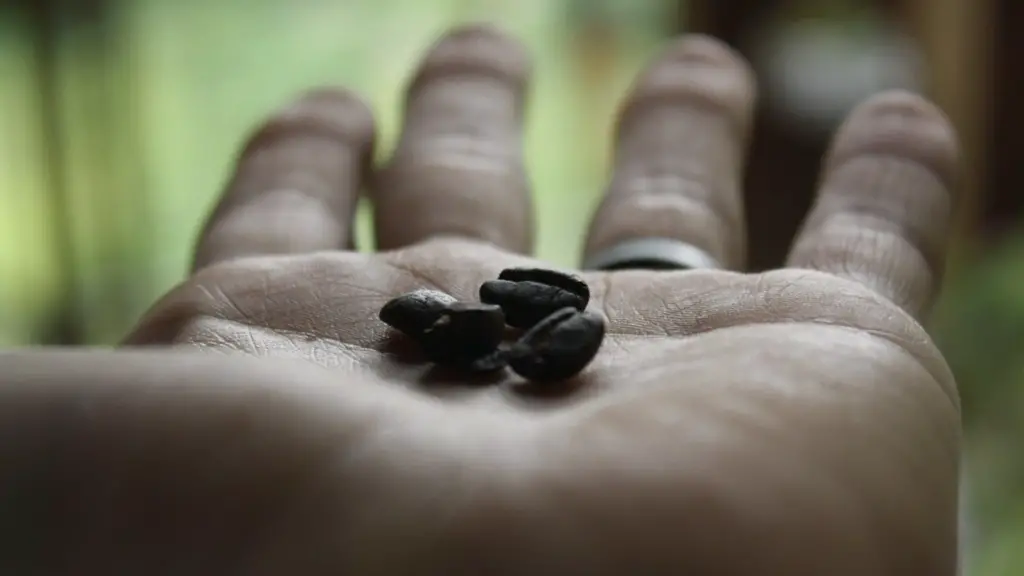Drinking black coffee does not directly cause constipation, but it can be a contributing factor. Constipation, or having difficulty passing stool, is a wide-spread and common issue. It can be a sign of a more serious digestive condition, or it can be a sympton of diet, lifestyle, or medication. Coffee is one of the factors that can contribute to constipation, due to its caffeine content and lack of fiber. There is also evidence that coffee can act as a diuretic, which could further exacerbate potential constipation.
In terms of the caffeine content of coffee, there is no universal answer as to whether black coffee and constipation are related. A moderate amount of caffeine can act as a stimulant, speeding up the metabolism and thus aiding in digestion. However, too much caffeine may reduce the rate of digestion, leading to constipation. Generally, a cup of black coffee contains 90-190mg of caffeine and many experts recommend you not to exceed 400mg a day.
Fiber is an important source of nutrition in any healthy diet. Fiber helps keep the digestive system functioning normally and aids in regulating bowel movements. Black coffee does not contain fiber, however, adding some cream and/or sugar can help add some fiber to your coffee. You should also be aware that coffee can come with natural diuretic effects, which means it can flush out vital nutrients and fluids from the body. Such effects can result in dehydration and dehydration can lead to constipation.
In terms of medical advice, many doctors suggest that if you have digestive problems such as constipation, you should reduce the amount of black coffee you drink. The best approach is to replace coffee with other drinks that contain beneficial nutrients and fiber. This can include herbal teas, green tea, black tea, or even juiced fruits and vegetables. Additionally, you can add some fruits and nuts to your breakfast or snacks in order to increase dietary fiber content.
It is also important to remember that constipation can be symptomatic of other health issues, so if you experience constipation for more than two weeks, it is advisable to contact your doctor for further evaluation and diagnosis. The doctor may consider other lifestyle factors that could be influencing your constipation, such as stress, dehydration, a lack of exercise, or medications. It is wise to be proactive about understanding and addressing the root cause of your constipation.
Environmental Factors Can Increase the Risk of Constipation
It is important to consider all of the influences that could be contributing to constipation, and your environment is one of them. The quality of the air that we breathe and the food that we eat can all have a direct impact on our digestion. Pollutants and toxins in the air, as well as pesticides and other chemicals in our food, can affect the microbiome and make us more prone to digestive problems, including constipation. Therefore, it is important to be mindful of the environmental factors that could be contributing to your constipation.
It is wise to take measures to reduce your exposure to environmental hazardous by avoiding close contact with pollutants, having your food and water tested, and finding healthy and clean sources of food. Additionally, it can be advantageous to look into lifestyle choices that can help promote healthy digestion, such as exercising regularly and eating a balanced diet. All these steps can help support digestive health and reduce the risk of developing constipation.
Lifestyle Choices Can Help Combat Constipation
In addition to monitoring environmental factors, making certain lifestyle changes can also be beneficial when it comes to constipation. Eating more fiber-rich foods, drinking plenty of fluids, and engaging in regular physical activity can all help promote healthy digestion. Getting adequate amounts of sleep and managing stress levels can also help with digestion and constipation. Additionally, engaging in relaxation techniques, such as mindfulness and yoga, can help reduce stress-levels.
It is also important to be aware of your overall diet and how it affects your digestion. Eating more unprocessed and fresh foods can be beneficial for digestive health, as can avoiding foods that can irritate your digestive system, such as dairy and gluten. Consider your body’s individual needs and make sure to eat in ways that make you feel your best.
Caffeine Is Not the Only Factor When It Comes to Coffee and Constipation
At the end of the day, it is important to keep in mind that caffeine is only one factor when it comes to coffee and constipation. What matters is your overall diet and lifestyle, as well as environmental factors. If you feel that drinking black coffee is causing your constipation, it is beneficial to consider other options. Try replacing black coffee with other drinks that contain beneficial nutrients and fiber, such as juiced fruits and vegetables, herbal teas, and green tea.
Furthermore, engage in lifestyle activities that promote healthy digestion, such as getting adequate amounts of sleep and exercising regularly. Pay attention to how your diet and environment can impact your digestion and make sure to take necessary steps to reduce anxiety and stress-levels. By understanding the various factors that can influence constipation, it is possible to find a way to keep the digestive system running smoothly.
Natural Home Remedies Can Help With Constipation
In addition to lifestyle changes, there are some natural remedies that can be used to help with constipation. Eating natural sources of fiber, such as fruits and nuts, as well as drinking plenty of fluids and engaging in regular physical activity can all help promote healthy digestion. Additionally, natural home remedies, such as drinking warm lemon water and chamomile tea, can also be beneficial. Further remedies include consuming probiotics to support gut health, drinking aloe vera juice, and eating prunes.
It is also important to remember that home remedies should be used in moderation and in concurrence with a healthy and balanced diet. Additionally, be sure to speak with your doctor if your constipation persists. They can provide additional medical advice and support in diagnosing potential underlying issues.
Adapt Your Diet and Lifestyle to Reduce Constipation
Ultimately, it is possible to drink black coffee without experiencing constipation. That said, it is important to be aware of all the influencing factors, such as your environment, diet, and lifestyle. Considering these different elements can help you to find a way to reduce your constipation risk. Adapting your diet and lifestyle to include natural sources of fiber, plenty of fluids, and regular exercise can all be beneficial. Furthermore, reducing your caffeine consumption and exploring other drink options can also be advantageous.
Finally, make sure to contact your doctor should you experience constipation for more than two weeks. By taking all of the necessary actions and being aware of all potential contributing factors, it is possible to reduce your risk of developing constipation.



